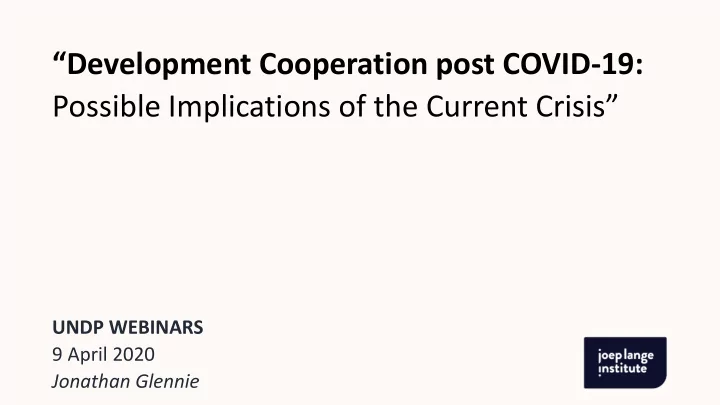

“Development Cooperation post COVID -19: Possible Implications of the Current Crisis” UNDP WEBINARS 9 April 2020 Jonathan Glennie
My argument 1. Think big We are seeing calls for global govt, UBI, major state intervention. The idea I will present today was radical when I first presented it a few years ago. Suddenly seems quite unambitious! 2. Fundamental point is: resurgence of “the public”. This crisis will demonstrate the importance of public funds, during the crisis and beyond (ie if it’s good enough for COVID19 why not for persistent infant mortality, or climate change?) 3. Public interventions have to be funded. Most important progress required at national level. But we also need progress on international level, mostly on taxation, but also.... 4. …we need to reaffirm the importance of grant financing for international development and sustainability. We need MUCH more money, and it needs to be managed very differently. 5. Can’t predict how it will play out. After the 2008 financial crash, I hoped people would finally get it! In fact, we saw more right-wing populism. But this is a moment to shape the next 50 years. Think Keynes and the Bretton Woods institutions…
2008: Need to push the international development sector to look beyond grant finance 2020: Need to remind the international development of the continued importance of grant finance COVID19 makes the case for us…
Financing the SDGs: “Billions to trillions” Domestic public spending Private finance & investment (international & national) Philanthropy (international & national) Remittances Overhauling taxation internationally International public finance
MDGs SDGs “Aid is not successful unless it has a “Development only really begins when sell-by date. If aid does not stop, it will extreme poverty is eradicated.” have failed.” Adolf Kloke-Lesch, former managing Donald Kaberuka, former President of director at GIZ the African Development Bank “There is basically no role for “Is it not time for these arcane income international development cooperation thresholds for ‘graduating’ from ‘low - in middle income countries.” income’ status to be laid to rest?” Paul Collier, author of “The Bottom Martin Ravallion, Director, Development Billion” Research Group, The World Bank
This proposal seeks to… • Clarify the role of concessional international public finance in the 21 st century • Respond to the higher ambitions set out in Agenda 2030 • Reflect the emergence of providers from the Global South • Lead to increases of financial commitments globally • Enhance impact and effectiveness • Democratise governance and accountability • Garner legitimacy from civil society • Emphasise global common benefits • Use language that is modern and non-paternalist • Secure strong and stable support from critical constituencies
An analogy: the European Union Billions transferred annually Aim is “convergence” Every country contributes , but poorer countries make a net gain Mostly grants Every country has a seat at the table Even richer countries receive support
• From poverty to inequality (convergence) & sustainability • From national progress to international goods
• From quantity to unique characteristics • From filling gaps to overcoming traps • From temporary to permanent
Some special characteristics of international public finance Therefore useful for e.g. Motivation • Responding to poverty/social sectors Concessionality • Research and innovation Flexibility (e.g. counter-cyclical) • Investment in green infrastructure Availability • Support to civil society • Incentivising developmental behaviour Expertise • Global public goods Transparency/accountability • Emergencies Sustainability • Macroeconomic stabilisation
Following the evidence on aid to MICs… “The evaluation [of aid to Colombia] found that in certain fields – such as the environment, institutional strengthening, and productive system support, as well as problems related to the struggle against inequality, internal displacement and human rights violations – the selective use of aid financing, expertise and shared experience was ‘ a determining factor in achieving better development results.’” Wood et al, 2011, Evaluation of Paris Agenda
• From north-south to universal • From graduation to gradation • From income/capita to a range of indicators
• From voluntary to contributory • From hierarchical to democratic
• From cost to investment • From donor-recipient to collective responsibility • From charity to common interest • From foreign to global/regional
Thank you @jonathanglennie www.joeplangeinstitute.org
Recommend
More recommend